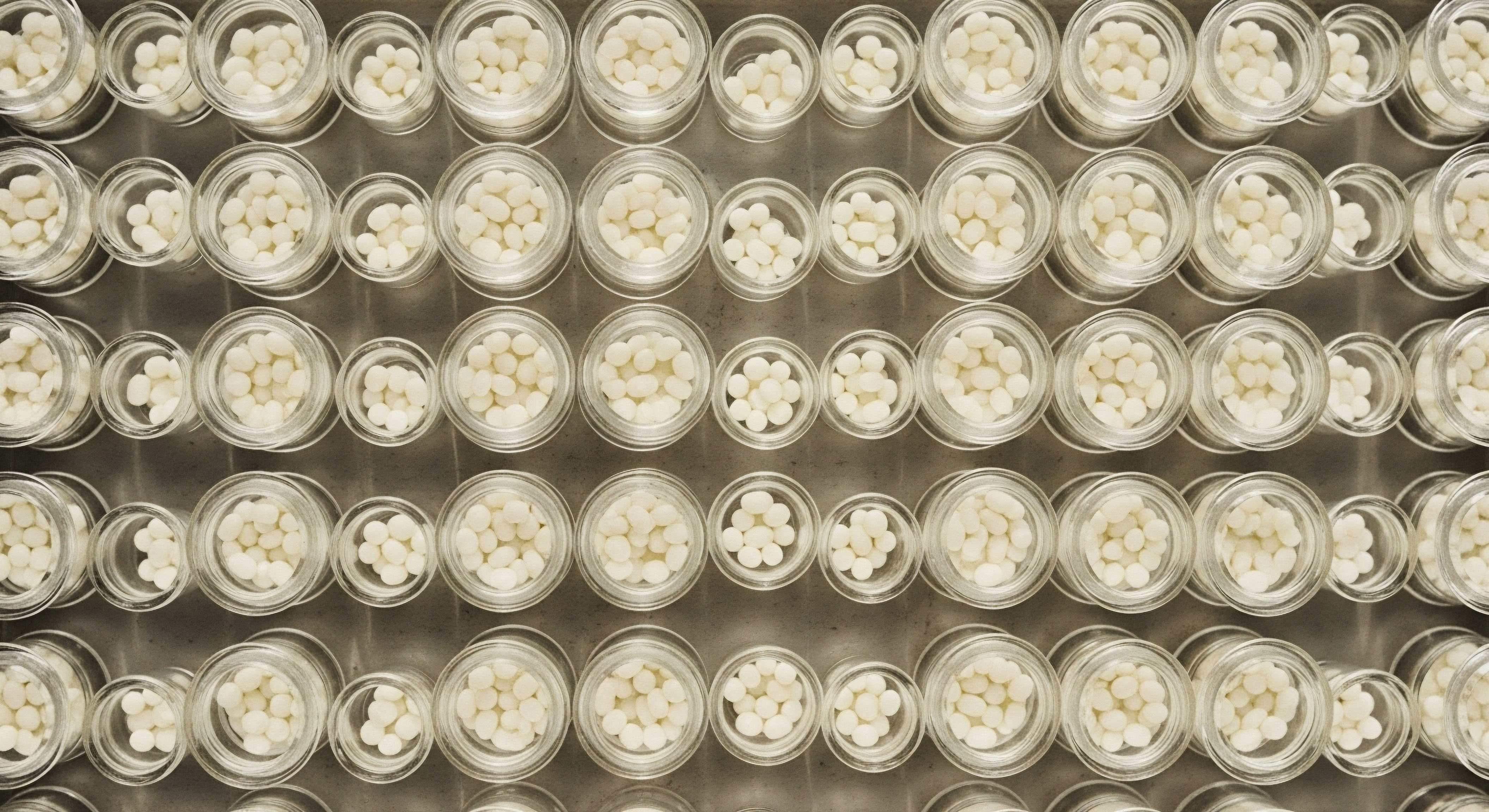

Fundamentals
When persistent fatigue clouds your days, when your body feels subtly out of sync, or when the vitality you once knew seems to have diminished, it is natural to seek answers. Many individuals experience these shifts, often attributing them to the inevitable march of time or the stresses of modern living.
Yet, beneath these surface experiences, a complex orchestra of biological messengers orchestrates our well-being ∞ our hormones. These chemical signals, traveling through the bloodstream, regulate everything from our energy levels and sleep patterns to our mood and metabolic function. When this intricate system falls out of balance, the effects can be deeply felt, manifesting as symptoms that disrupt daily life and diminish one’s sense of self.
Understanding the subtle language of your own biological systems represents a significant step toward reclaiming optimal function. This journey often involves exploring personalized wellness protocols, where specific therapeutic agents, such as peptides, play a vital role. Peptides are short chains of amino acids, the building blocks of proteins, and they act as highly specific signaling molecules within the body.
They can influence a wide array of physiological processes, from cellular repair and growth to immune modulation and metabolic regulation. The precision with which these molecules interact with our internal systems underscores the absolute necessity of their purity and accurate composition.
For those considering personalized protocols involving peptides, a critical question arises ∞ how do compounding pharmacies verify the quality of peptides sourced from international suppliers? This inquiry is not merely about regulatory compliance; it speaks directly to the safety and efficacy of the therapeutic agents entering your body.
Your well-being depends on the integrity of these compounds. Compounding pharmacies serve a unique role in healthcare, preparing customized medications for individual patient needs when commercially manufactured drugs are unsuitable or unavailable. This personalization extends to the sourcing of raw materials, known as active pharmaceutical ingredients (APIs), which often come from global networks.
Ensuring peptide quality is paramount for patient safety and therapeutic success in personalized wellness protocols.
The trust placed in a compounding pharmacy rests on its rigorous commitment to quality control, particularly when dealing with substances like peptides that demand precise molecular structures for their intended biological actions. The process of obtaining these specialized compounds from international sources introduces layers of complexity, requiring a robust system of verification.
Each step, from the initial selection of a supplier to the final preparation of the medication, must adhere to stringent standards to ensure the identity, purity, potency, and safety of the peptide. Without such meticulous oversight, the potential for suboptimal outcomes or adverse reactions increases, undermining the very purpose of personalized care.

Why Peptide Quality Matters for Your Health
The body’s endocrine system operates with remarkable precision, relying on specific molecular keys to unlock particular cellular responses. Peptides, as these keys, must fit their locks perfectly. An impure peptide, or one with an incorrect amino acid sequence, might not only fail to produce the desired therapeutic effect but could also trigger unintended biological responses.
Consider the delicate balance of the hypothalamic-pituitary-gonadal (HPG) axis, which governs reproductive and hormonal functions. A peptide intended to modulate this axis, if compromised, could disrupt its delicate feedback loops, leading to unpredictable hormonal fluctuations rather than the intended restoration of balance.
The consequences of compromised peptide quality extend beyond immediate symptoms. Long-term use of substandard compounds could lead to chronic systemic inflammation, metabolic dysregulation, or even immune responses against the altered molecules. This is why the verification process is not a mere formality; it is a fundamental safeguard for your health journey. It ensures that the personalized protocol you undertake is built upon a foundation of reliable, biologically active compounds, allowing your body’s systems to recalibrate and function optimally.


Intermediate
For individuals seeking to restore hormonal equilibrium or enhance specific physiological functions, various clinical protocols involving peptides have gained prominence. These protocols are designed to work synergistically with the body’s intrinsic regulatory mechanisms, offering a targeted approach to wellness. Understanding the precise actions of these therapeutic agents, and the meticulous processes behind their preparation, is essential for anyone considering such interventions.

Understanding Peptide Protocols and Their Purpose
Testosterone Replacement Therapy, for both men and women, often involves the careful administration of compounds to restore physiological levels of this vital hormone. For men experiencing symptoms of low testosterone, a standard protocol might include weekly intramuscular injections of Testosterone Cypionate, frequently combined with Gonadorelin to support natural testosterone production and fertility, and Anastrozole to manage estrogen conversion.
Women, too, can benefit from testosterone optimization, typically through lower-dose subcutaneous injections of Testosterone Cypionate or long-acting pellet therapy, often alongside Progesterone to support overall hormonal balance. These protocols aim to recalibrate the endocrine system, addressing concerns such as diminished energy, altered body composition, or reduced libido.
Beyond direct hormone replacement, specific peptides are utilized to stimulate the body’s own production of growth hormone or to address other targeted physiological needs. Peptides like Sermorelin, Ipamorelin, and CJC-1295 are often employed in growth hormone peptide therapy, aiming to improve sleep quality, support muscle gain, and aid in fat loss.
Other specialized peptides, such as PT-141, address sexual health concerns, while Pentadeca Arginate (PDA) supports tissue repair and inflammation modulation. Each peptide is selected for its specific biological action, designed to interact with particular receptors or pathways within the body.
Compounding pharmacies provide personalized medications, requiring stringent quality control for all sourced ingredients.

The Role of Compounding Pharmacies
Compounding pharmacies are distinct from traditional pharmacies; they prepare customized medications based on individual patient prescriptions. This personalized approach allows for tailored dosages, unique delivery methods, or the exclusion of allergens, addressing needs that commercial products cannot meet. When it comes to peptides, these pharmacies often source raw active pharmaceutical ingredients (APIs) from a global supply chain.
The integrity of this supply chain is paramount, as the quality of the final compounded medication directly depends on the purity and authenticity of its starting materials.
The initial step in quality verification involves a rigorous qualification process for international suppliers. Compounding pharmacies do not simply purchase from any vendor; they establish relationships with reputable manufacturers who can demonstrate a consistent history of producing high-quality pharmaceutical-grade materials. This involves a thorough review of the supplier’s manufacturing facilities, their quality management systems, and their adherence to international standards such as Good Manufacturing Practices (GMP).
- Supplier Qualification ∞ Compounding pharmacies conduct extensive due diligence on potential international suppliers. This includes reviewing their manufacturing processes, facility audits, and regulatory compliance records.
- Regulatory Adherence ∞ Suppliers must be registered with relevant regulatory bodies, such as the FDA for APIs intended for the U.S. market. They must also provide evidence that their products are not labeled “For lab use only” or “Research use only,” as such materials are prohibited for human compounding.
- Documentation Review ∞ A critical component of supplier qualification involves scrutinizing the documentation provided by the supplier, including their quality control procedures and historical data on product consistency.

Initial Verification Steps
Upon receipt of peptide APIs from international suppliers, compounding pharmacies implement a series of verification steps to confirm the quality of the incoming raw materials. This process begins even before the material is accepted into the pharmacy’s inventory.
A primary document in this verification is the Certificate of Analysis (CoA). This document, provided by the supplier, details the results of their own quality control tests performed on the specific batch of peptide. A comprehensive CoA should include ∞
- Identity ∞ Confirmation that the substance is indeed the peptide it claims to be.
- Purity ∞ The percentage of the active peptide, and the levels of any impurities.
- Potency ∞ The strength or concentration of the active ingredient.
- Physical Characteristics ∞ Appearance, solubility, and other physical properties.
- Microbiological Testing ∞ Assurance of sterility and absence of harmful microorganisms or endotoxins.
While the CoA provides initial assurance, reputable compounding pharmacies do not rely solely on the supplier’s word. They implement their own internal testing protocols to independently verify the information presented on the CoA. This dual-layer verification adds a crucial safeguard, particularly when sourcing from diverse international origins where regulatory oversight might vary.
| Peptide | Primary Clinical Application | Typical Administration |
|---|---|---|
| Testosterone Cypionate | Hormone replacement for low testosterone in men and women | Intramuscular or subcutaneous injection |
| Sermorelin | Growth hormone secretagogue, anti-aging, body composition | Subcutaneous injection |
| Ipamorelin / CJC-1295 | Growth hormone release, muscle gain, fat loss, sleep improvement | Subcutaneous injection |
| PT-141 | Sexual health, libido enhancement | Subcutaneous injection |
| Pentadeca Arginate (PDA) | Tissue repair, healing, inflammation reduction | Subcutaneous injection |


Academic
The rigorous verification of peptide quality, particularly when sourced from international suppliers, represents a cornerstone of patient safety and therapeutic efficacy in compounding pharmacy. This process extends far beyond mere documentation review, delving into sophisticated analytical chemistry and a deep understanding of global pharmaceutical supply chain dynamics. The complexities inherent in synthesizing and purifying peptides necessitate advanced testing methodologies to ensure their identity, purity, and biological activity.

Advanced Analytical Techniques for Peptide Verification
Compounding pharmacies committed to the highest standards employ a suite of analytical techniques to independently assess the quality of incoming peptide APIs. These methods provide a molecular fingerprint of the compound, revealing its precise structure, potential impurities, and overall integrity.
- High-Performance Liquid Chromatography (HPLC) ∞ This chromatographic technique is indispensable for separating, identifying, and quantifying each component in a mixture. For peptides, reversed-phase HPLC (RP-HPLC) is commonly used to assess purity by separating the target peptide from related impurities, such as deletion sequences, truncated sequences, or other synthesis by-products. The area under the peak corresponding to the main peptide indicates its purity percentage.
- Mass Spectrometry (MS) ∞ Often coupled with HPLC (LC-MS), mass spectrometry provides precise molecular weight information, confirming the peptide’s identity and detecting any unintended modifications or contaminants. Electron-transfer dissociation (ETD) MS/MS offers extensive sequence information, crucial for unambiguous identification and characterization of post-translational modifications.
- Nuclear Magnetic Resonance (NMR) Spectroscopy ∞ NMR provides detailed structural information about molecules, allowing for the confirmation of the peptide’s chemical structure and the identification of impurities that might not be detectable by other methods. It offers a comprehensive view of the atomic connectivity within the peptide.
- Fourier-Transform Infrared (FTIR) Spectroscopy ∞ FTIR analyzes the vibrational modes of molecules, providing a unique spectral fingerprint that can be used for identity confirmation and to detect the presence of specific functional groups or contaminants.
- Amino Acid Analysis (AAA) ∞ This method quantifies the constituent amino acids of a peptide after hydrolysis, confirming the expected amino acid composition and providing a measure of peptide content.
These analytical tools collectively provide a comprehensive profile of the peptide, allowing the compounding pharmacy to verify that the material meets stringent specifications for pharmaceutical use. The absence of these robust in-house testing capabilities can leave a pharmacy vulnerable to receiving and dispensing substandard or even harmful products.

Navigating International Sourcing and Supply Chain Integrity
The global nature of pharmaceutical raw material sourcing introduces significant challenges. Many peptide building block suppliers are located in the Asia-Pacific region, particularly China, due to historical offshoring trends. While many of these suppliers are reputable, the sheer volume and complexity of the international supply chain necessitate heightened vigilance.
One primary concern involves regulatory harmonization. Different countries may have varying standards for pharmaceutical manufacturing and quality control. A compounding pharmacy must ensure that its international suppliers adhere to standards equivalent to or exceeding those mandated by regulatory bodies like the FDA in the United States.
This often requires on-site audits of manufacturing facilities, conducted by qualified personnel, to assess compliance with current Good Manufacturing Practices (cGMP). These audits examine everything from facility design and environmental controls to personnel training and documentation practices.
Rigorous analytical testing, including HPLC and Mass Spectrometry, is essential to confirm peptide identity, purity, and potency.
The integrity of the supply chain itself is another critical aspect. This includes measures to prevent counterfeiting, diversion, and contamination during transit. Traceability systems, such as unique batch identifiers and serialization, become vital in tracking the product from its origin to the compounding pharmacy. Secure packaging and controlled storage conditions during shipping are also paramount, especially for temperature-sensitive peptides, to prevent degradation.

Regulatory Frameworks and Compliance
Compounding pharmacies operate under a complex regulatory landscape. In the United States, Section 503A of the Food, Drug & Cosmetic Act governs traditional compounding pharmacies, while Section 503B applies to outsourcing facilities. These regulations dictate which substances are eligible for compounding.
For a peptide to be compounded, it must meet specific criteria ∞ it must be an active ingredient in an FDA-approved drug product, have a United States Pharmacopeia (USP) or National Formulary drug monograph, or appear on the 503A Bulks List. Peptides classified as biologics (typically those with more than 40 amino acids) cannot be compounded by 503A facilities.
The USP plays a crucial role by establishing public standards for drug substances and products, including peptides. These monographs specify tests, methods, and acceptance criteria for identity, strength, quality, and purity. Compounding pharmacies often use USP reference standards to calibrate their analytical equipment and validate their testing methods, ensuring consistency and accuracy in their quality control processes.
| Analytical Method | Primary Application in Peptide Verification | Information Provided |
|---|---|---|
| High-Performance Liquid Chromatography (HPLC) | Purity assessment, impurity profiling, quantification | Separation of components, percentage of active peptide, identification of related impurities |
| Mass Spectrometry (MS) | Identity confirmation, molecular weight determination, impurity detection | Exact molecular mass, structural confirmation, presence of contaminants or degradation products |
| Nuclear Magnetic Resonance (NMR) Spectroscopy | Structural elucidation, confirmation of chemical bonds | Detailed atomic connectivity, confirmation of peptide sequence and structure |
| Fourier-Transform Infrared (FTIR) Spectroscopy | Identity verification, detection of functional groups | Spectral fingerprint for compound identification, presence of specific chemical bonds |
| Amino Acid Analysis (AAA) | Content determination, composition verification | Quantification of constituent amino acids, confirmation of expected composition |

Clinical Implications of Quality Assurance
The meticulous efforts in peptide quality verification directly translate into tangible benefits for patient well-being. When a compounding pharmacy ensures the purity and potency of its sourced peptides, it minimizes the risk of administering a sub-potent or contaminated product. A sub-potent peptide may lead to a lack of therapeutic response, prolonging symptoms and delaying recovery. Conversely, an impure peptide containing unknown contaminants or incorrect sequences could trigger adverse reactions, ranging from allergic responses to systemic toxicity.
Consider the delicate balance of the endocrine system. Hormones and peptides operate within tightly regulated feedback loops. Introducing a compromised peptide could disrupt these loops, leading to unintended hormonal imbalances or even suppressing the body’s natural production of essential compounds.
For instance, a contaminated growth hormone-releasing peptide might not only fail to stimulate growth hormone release but could also introduce inflammatory mediators, impacting metabolic health and overall systemic function. The rigorous quality control measures implemented by compounding pharmacies are therefore not just about meeting regulatory mandates; they are about safeguarding the intricate biological systems that underpin human vitality.

References
- Belmar Pharma Solutions. (n.d.). Quality Control. Retrieved from Belmar Pharma Solutions website.
- Alliance for Pharmacy Compounding. (2024, March 1). Understanding Law and Regulation Governing the Compounding of Peptide Products. Retrieved from Join APC Today website.
- Peptide Sciences. (n.d.). Buy Peptides for Scientific Research and Development. Retrieved from Peptide Sciences website.
- International Journal of Science and Research Archive. (2025, February 24). Analytical techniques for peptide-based drug development ∞ Characterization, stability and quality control.
- Almac. (n.d.). Analytical method development for synthetic peptide purity and impurities content by UHPLC ∞ illustrated case study.
- Josephs, R. et al. (2018). Identification and accurate quantification of structurally related peptide impurities in synthetic human C-peptide by liquid chromatography-high resolution mass spectrometry. Analytical and Bioanalytical Chemistry, 410(20), 4935-4944.
- United States Pharmacopeia. (n.d.). USP Peptide Standards. Retrieved from USP website.
- United States Pharmacopeia. (n.d.). Peptide Standards. Retrieved from USP website.
- Frier Levitt. (2025, April 3). Regulatory Status of Peptide Compounding in 2025. Retrieved from Frier Levitt website.
- The FDA Group. (2017, December 22). Assessing the Applicability and Necessity of CGMP to Drug Compounding. Retrieved from The FDA Group website.
- The Pew Charitable Trusts. (2019, February). Manufacturing Guidelines Play Vital Role in Safety of Compounded Drugs. Retrieved from The Pew Charitable Trusts website.
- RxRise. (2024, April 18). Ensuring Supply Chain Integrity & Safety in Pharmaceutical Wholesale. Retrieved from RxRise website.
- Prism. (2025, April 9). Pharmaceutical Supply Chain Integrity. Retrieved from Prism Sustainability Directory website.
- EUDRAC. (n.d.). Pharma Supply Chain Integrity – EU & Global Rules. Retrieved from EUDRAC website.

Reflection
The journey toward understanding your own biological systems and reclaiming vitality is deeply personal. The information presented here, detailing the rigorous processes compounding pharmacies undertake to verify peptide quality, serves as a guidepost on that path. It reveals the layers of scientific precision and regulatory adherence that underpin effective personalized wellness protocols.
Consider this knowledge not as a destination, but as a foundational step. Your body’s unique biochemical landscape requires a tailored approach, and true well-being arises from a partnership between informed self-awareness and expert clinical guidance. This understanding empowers you to ask discerning questions, to seek out practitioners and pharmacies committed to the highest standards, and to participate actively in your health decisions.

What Does This Mean for Your Health Choices?
Armed with insights into peptide quality verification, you can approach personalized health solutions with greater confidence. It reinforces the value of choosing compounding pharmacies that demonstrate transparency in their sourcing and robust in-house testing capabilities. Your health is an ongoing dialogue with your body, and the quality of the therapeutic agents you introduce plays a central role in that conversation.
The pursuit of optimal health is a continuous process of learning and adaptation. As you move forward, let this understanding reinforce your commitment to a proactive stance on your well-being, knowing that the integrity of the compounds you consider is as vital as the intention behind their use.



